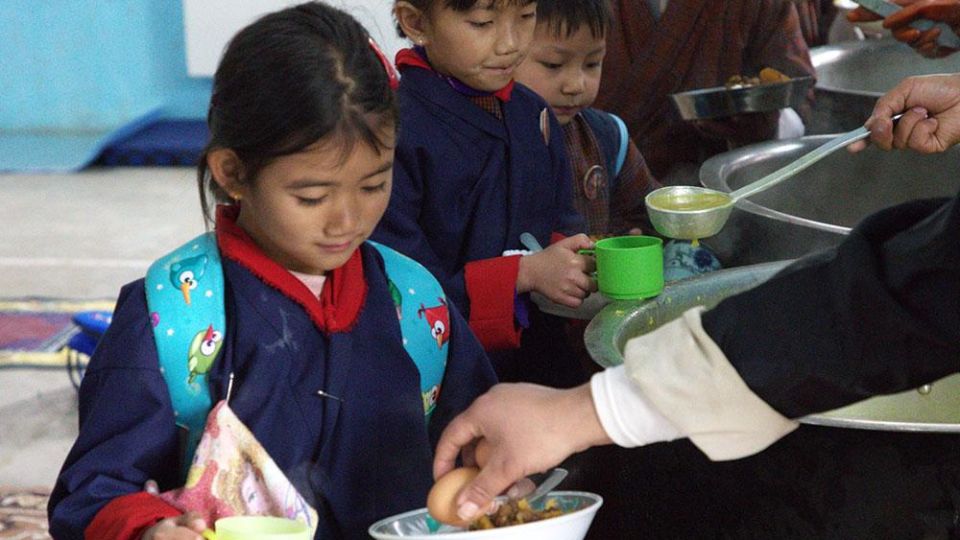July 21, 2025
THIMPHU – With the egg initiative launched in February, which provides one egg per child to 31,579 students across the country, there has been a noticeable—though not severe—egg shortage nationwide.
The “One-Child, One-Egg” initiative, launched in February, has been transforming school nutrition by providing eggs to students as part of the school feeding programme. The initiative covers 345 schools—290 primary schools, five special education institutes, and 50 extended classrooms. So far, it has delivered about 2.4 million eggs.
Since the launch of the initiative, wholesale egg prices have increased—from about Nu 1,900 per carton in February to around Nu 2,300 today, with small grocery stores struggling to obtain eggs as retail prices continue to rise.
In Thimphu, eggs are now sold at Nu 370 per tray, up from about Nu 280 in February.
A poultry farmer in Paro, Gyeltshen, said that the egg shortage is likely to become more severe in the coming months, as he is already struggling to meet market demand.
“Currently, I am able to meet the demand, but my stock doesn’t even last a week. If the current situation continues, the price of eggs could shoot up to Nu 3,000,” he said.
He operates two poultry farms with about 3,500 chickens. He supplies eggs to Paro Canteen, a grocery shop in Paro, and to major grocery stores in Thimphu, including 8Eleven and Junction Mart. He delivers about 30 cartons of eggs—each carton containing seven trays—to 8Eleven alone in a month.
The owner of Paro Canteen, Yeshi Choden, said that egg prices have been rising due to a shortage. “The quality of eggs has also deteriorated compared to before, as demand is high. We are buying eggs at higher rates despite the low supply and strong market demand.”
In February, her wholesale rate was Nu 1,950 per carton, and she sold eggs at Nu 280 per tray. Now, her wholesale rate is Nu 2,400 per carton, with a retail price of Nu 370 per tray. Last month, her wholesale rate was Nu 2,350 per carton and her retail price was Nu 350.
In Pemagatshel, poultry farmer Namkha, who supplies eggs in the dzongkhag, said that egg prices have also increased, with the current wholesale rate at Nu 2,300 per carton, compared to Nu 2,200 and Nu 2,100 in February.
He said that the summer heat caused the death of 50–60 of his chickens, and the price of Karma Feed has also gone up. He currently has about 1,900 chickens.
“I also deliver eggs to schools as part of the One-Child, One-Egg initiative in Pemagatshel. Since deliveries are only once a month, I have not faced a severe shortage in meeting local demand,” he said.
“However, because other poultry farmers are sending their eggs to other districts, there is now a shortage in my own district,” he added.
Meanwhile, in Changyuel, Wangdue, a local grocery vendor has not been able to get eggs for the last five days. “We are struggling to get eggs; there is a severe shortage, and prices have also shot up. Where are the eggs?”
With egg prices steadily rising, local farmers and vendors involved in the school egg initiative are showing less interest in delivering eggs to schools.
An official from Bhutan Livestock Development Corporation Limited said they have been educating farmers and vendors about market dynamics and convincing them to continue supplying eggs to schools, as this initiative provides a steady market for them.
“Unlike the fluctuating market prices, if farmers send eggs only to the market and not to schools, there will obviously be enough eggs in the market, which will cause prices to decrease again,” the official said.
For the egg initiative in schools, 186 poultry farmers and 78 private vendors across the country are involved. They are paid a minimum of Nu 10 per egg.
In the first year of pilot rollout, the initiative is projected to require about 8.4 million eggs annually, with an estimated cost of Nu 101 million.


